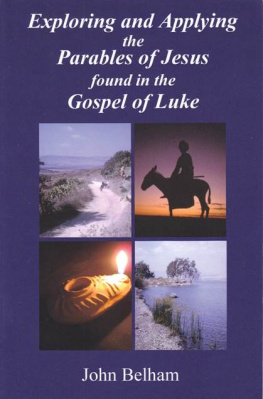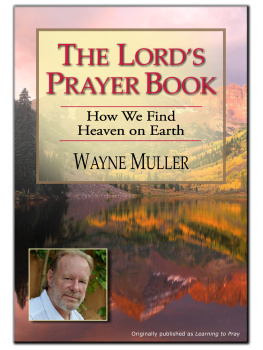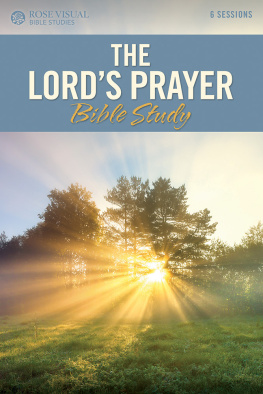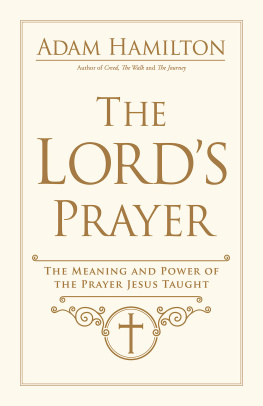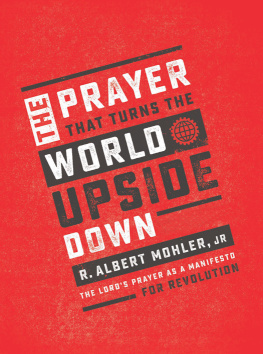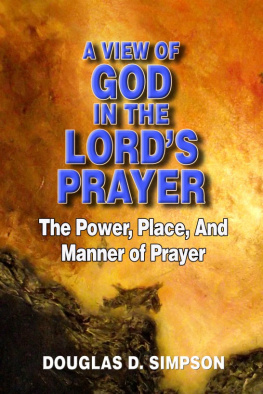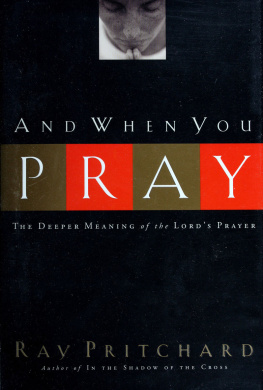Exploring and applying
the Lords Prayer
A prayer to change the world
John Belham
Parva Press
Copyright John Belham 2022
The right of the author has been asserted.
All rights reserved. No part of this publication may be commercially reproduced, stored in a retrieval system or transmitted, in any form, or by any means, electronic, mechanical, photocopying, recording or otherwise, without the prior permission of the publisher.
First published 2000 by Parva Press
This edition 2022
British Library Cataloguing in Publication Data.
A catalogue record for this publication is available from the British Library.
Exploring and Applying the Lords Prayer
ISBN 978-0-9537489-1-4
The Bible quotations, paraphrases and allusions are taken from The Holy Bible Authorised King James Version.
To the glory of God
and for the encouragement of his people
An English text of the prayer itself
Our Father in heaven,
Hallowed be your name.
Your kingdom come.
Your will be done on earth, as it is in heaven.
Give us this day our daily bread.
And forgive us our trespasses,
as we forgive those who trespass against us.
And lead us not into temptation,
but deliver us from evil;
For yours is the kingdom, the power
and the glory forever. Amen
Contents
Landmarks
Our Father in heaven
... the gracious encounter
The Lords Prayer is recorded in the gospels of both Matthew and Luke. In Matthew, it forms a part of the Sermon on the Mount. In Luke, the disciples had been with Jesus for many months. They had heard him speak and seen him heal the sick and set men free. They had also seen their Lord rise a great while before daybreak to be quiet; to spend time alone with his heavenly Father.
Luke tells us that Jesus had just returned from such a time of prayer, and so it was natural for them to ask, Lord, teach us to pray. As a result of that request we have what we call The Lords Prayer. The prayer is our Lords teaching and our Lords pattern concerning prayer. It is how we should pray.
The Lords Prayer was not given as a literary masterpiece to be viewed and admired. Nor is it a beautiful set piece to be recited morning by morning as if the lovely words themselves would infuse a beauty into our lives but had no practical meaning or bearing on the way we live. It was given to be a pattern and a basis of prayer for real people in the real world. It is the pattern our Lord has given his disciples. Even then it is not only a recitation or set prayer but truly a whole house of prayer with many rooms to explore. Each phrase of the prayer or 'room' opens to us a different aspect of God's world, the world for which we are called to pray.
Beware then, of rushing around the house from phrase to phrase, room to room simply checking them off. But rather, take time to walk from room to room, phrase to phrase, and bring before our heavenly Father, the people, the contents and the views, both near and far, of each room or phrase in turn.
We begin with just the first phrase, Our Father in heaven, or, Father, as it is in the earliest copies of Lukes gospel. Here is the grand entrance hall in which we are introduced to the King. Our Lord teaches us straight away to whom we should pray and, indeed, who may pray in this way.
The Lord was teaching his Hebrew disciples to pray, and the Hebrew people were very proud of Abraham their father. Abraham was the friend of God. Abraham was successful in pleading with God to spare cities. It would have been quite natural, from our point of view at least, for our Lord to have taught them to pray: Father Abraham, friend of God, plead for us, pray for us. But he did not do that.
There were other great spiritual leaders, for example Moses. When God spoke with ordinary men, he spoke with them from a distance, but when God spoke with Moses he spoke with him face to face. So it would have been natural, again from our point of view, if our Lord had said, Pray like this: Father Moses, to whom has been given the privilege of speaking with God face to face, pray for us, intercede for us, pray on our behalf. But again, he did not. The same of Elijah, that great man of God by whose passionate prayers came drought, fire and rain: Elijah pray for us; intercede on our behalf.
Our Lord nowhere teaches us to pray in this way and neither do his chosen apostles, and there is an enormous lesson here straight away. If we would be disciples of our Lord Jesus: if we are willing to submit to his teaching, we will not offer our prayers to those Old Testament saints or to their New Testament counterparts.
In this prayer our Lord offers us a privilege far, far greater. We are not invited to come to a mere servant of God, no matter how great a spiritual giant he or she may have been. We are invited to come with boldness into the very presence of the God and Father of our Lord Jesus Christ; invited to speak with Almighty God himself.
The invitation is absolutely overwhelming. How dare we? We certainly may not by any merit or right of our own. But, through his Son, the Lord God invites us, as we pray, to come into his awesome and royal presence; indeed, we are called to do so with boldness, and by express invitation.
Once we have understood the greatness and amazing privilege of such an invitation, to refuse would be as unthinkably rude as receiving an invitation to a royal reception or garden party but, on the occasion, actively choosing to speak only with the servants.
How should we address Almighty God?
We are taught to approach him as our Father in heaven. This again is something absolutely wonderful; that we, mere mortals, are invited to address the sovereign Lord of the entire universe as, Father. The Hebrew people of our Lords day knew almost nothing of this intimate knowledge of God. And in our own day and culture, for a variety of reasons, many people find it very difficult. We think more easily of God as an impersonal cosmic force, or the great architect, or maybe the pattern set by our own father is a great stumbling block. However, the privilege of Christs disciples is that we may know God, the Sovereign Lord, as our heavenly Father; the best and greatest of Fathers, who loves us and cares for us.
The apostle Paul puts it even more strongly when he says that those who have the Spirit of our Lord Jesus can address God the creator as Abba, Father, my Father. That is the privilege of disciples of our Lord Jesus. We can, in a real sense, be sons and daughters with the freedom of approach seen in a little child with a loving parent.
Who may pray like this?
Here is a prayer for disciples of our Lord Jesus. He came to his own people, writes the apostle John, and they did not receive him. They rejected him. But to those among them who received him he gave the power, the right, the authority to be the sons and daughters of God.
Those in our own day who are given this right and privilege, are also those who receive the Lord Jesus; those who are willing to trust him for who he is and for what he has done for us; willing to learn what he commands and willing to do it. These, and only these, are true disciples of Christ and to them is given this great and glorious privilege... to be the sons and daughters of God.
Finally, do notice that this is the family prayer; a prayer for all disciples. So, rightly, in English the prayer begins with the little word

